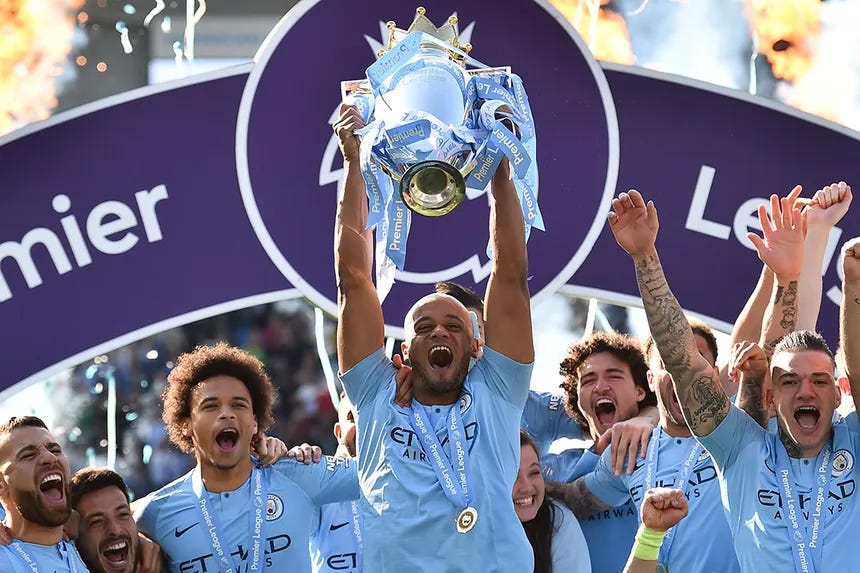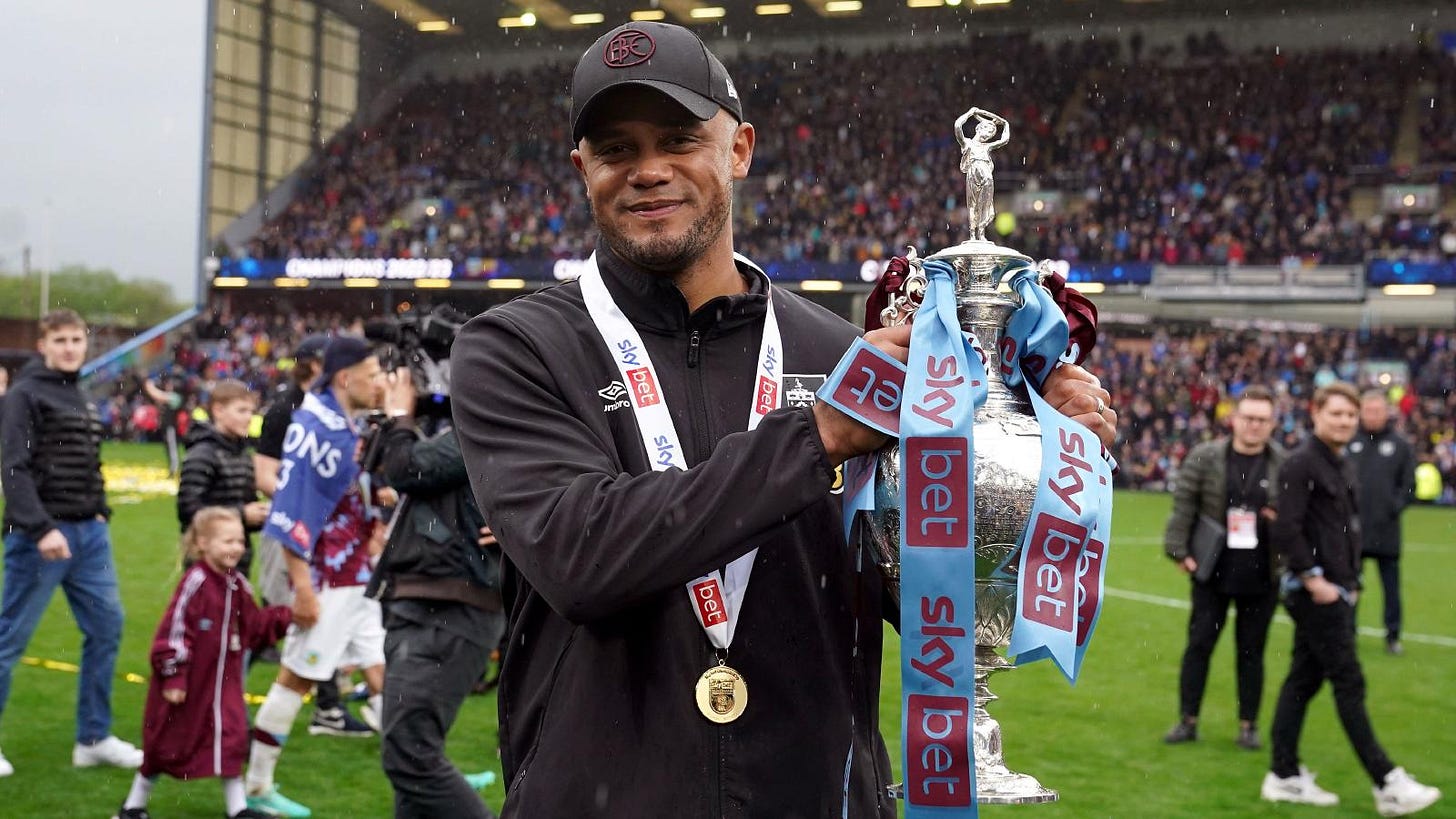Kompany's Blueprint: The Art of Building a Cohesive Squad
Completely transforming a Burnley side synonymous with Dyche's "Brexit-Ball" into a free-flowing, free-scoring side in less than a year, just how good of a gaffer can Kompany become?
The oldest cell in a human body at any given time is approximately ten years old. After it dies, despite the fact – on a cellular level at least – you are now made up of completely new materials, one constant remains, you. It doesn’t matter how many of these transitions you go through in your lifetime, you are the ever-present, unceasing concept. In essence, we are all, somewhat paradoxically, a temporary collection of smaller elements that, for varying lengths of time, work as an overarching whole striving towards collective goals.
This is how football teams work, each cycle of new players staying for fluctuating periods to make up a squad or generation, whatever you want to call it — before dispersing far and wide into the footballing ether — while the club remains the constant. At Manchester City, Vincent Kompany was this last cell, the nucleus of the team. Arriving from Hamburg, on the cheap, in 2008 and eventually leaving for a starry-eyed return, as a player-manager, to his boyhood club, Anderlecht, Kompany was there for it all. At City, he outlived three managers in Hughes, Mancini and Pelligirini, before making his exit under the stewardship of a certain Josep Guardiola Sala. He survived several iterations of Manchester City squads, saw the team rise through the ranks to its near-constant perch at the top of the premier league pyramid and remained the club’s Mr Consistent.
As a manager, Kompany had what must be considered an ok start, even in the typically doomed player-manager role. His Anderlecht reached the semi-final of the Belgian Cup and qualified for the Europa Conference league, via the league playoffs. The next year they reached the final and came third in the league, not bad. But his first significant managerial achievements have come at Burnley. Following their relegation to the Championship, the club appointed the Belgian with the colossal cranium to be the man to think them back into the Premier League. Early April, his side secured promotion with seven games still to go and by the end of the same month, they were crowned champions, with Kompany picking up the Manager of the Season award as well as a handful of Manager of the Month awards along the way.
Obviously, the main achievement is getting Burnley back into the topflight of English football. Promotion was the task in hand which has been completed, resoundingly. But, more than that, Kompany achieved this by building a vibrant and cohesive squad. The Burnley that Kompany inherited had previously been under the stewardship of Dyche for over a decade, they were the oldest average starting XI in the Premier League the season before and after their relegation to the championship six senior players exited as free agents, including their first-choice centre-half pairing of James Tarkowski and captain Ben Mee. Kompany had to rebuild.
A few players choose to stay, and Josh Brownhill, Jack Cork and Jay Rodriguez have all looked revitalised under Kompany’s new system. But, even with the retention and rejuvenation of some old heads, around 15 players arrived to replace those exiting the Clarets. Five of these players were imported from the Jupiler League, having obviously been followed closely by Kompany during his time in Anderlecht, including Josh Cullen who he brought directly over from his previous club. After spending two years with Kompany at Anderlecht, it’s not surprising that Cullen has been pivotal to the team’s successful transition from route one 442 beans on toast brit-ball to a more cultured, possession-based, and expansive style of play. Cullen knows how to keep everything around him ticking over to the tune of Kompany’s desired rhythm.
Kompany has also been rather shrewd in his use of the loan market, which after their success this season could come back to bite him on the jacksie when the proverbial band breaks up. This is always the inherent risk with loanees, whose parent clubs come to realise the true value of their prodigal sons. Top scorer Nathan-nineteen-goals-Tella could be held ransom by Southampton when they are most likely relegated to the Championship. Taylor Harwood-Bellis from Manchester City has been a vital building block. Brought up on the methods Kompany wants to instil, he won’t be short of suitors in the summer transfer window – after proving himself to be a talent destined for beyond the confines of the English second tier. Likewise, Borussia Mönchengladbach loanee Jordan Beyer has also excelled but despite a pre-agreed fee being in place, he is still going to cost a pretty penny.
During this Burnley rebuild, Kompany has created a sense of comradery and cohesion in the dressing room that makes it seem like this group of players has been together for years and that has translated directly onto the pitch. The results have been staggering. In their 20 Championship home games, Burnley scored 43 times in the league. Overall, they scored 76 goals in 39 games; the most they achieved in a Premier League season was 45. The question is, can this be maintained when the club inevitably loses some pivotal player and must bring in another bunch to ensure Burnley remains a competitive outfit in this tougher division?
A 6-0 reality check by his former team in his old stomping ground in the FA Cup can be cited as evidence a significant upgrade is needed to bridge the gap between this excellent young Burnley team and the levels required to stay afloat in the prem. Can Mr Consistent do it again? He’s been part of enough squad regenerations in his time to know what it takes. But the lifespans of premier league managers are notoriously shorter than that of a player. Longevity is an incredibly rare trait, but Kompany does look to be a rare talent.
Callum Turner (@Biggg_C_)





